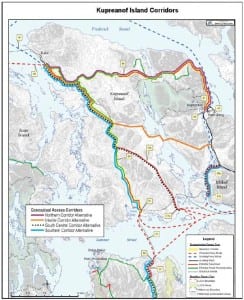Petersburg’s borough assembly is moving forward with a new version of its transient room tax ordinance after the original measure failed last month. During Monday’s regular meeting, the assembly passed a revised measure in the first of its three required readings. It extends the so-called bed tax borough-wide and includes a change aimed at making it fairer for lodges that combine the price of a room with food and fishing.
Under the original ordinance, thirty percent of the package price would be subject to taxation. Under the new version, the four-percent tax would be assessed on just 15 percent of the package price. So, for instance, a three thousand dollar lodge package would result in an eighteen dollar bed tax.
Assembly member John Hoag said the reduction was the result of some ad-hoc number crunching:
“…..to say ‘we want to make sure that the transient room tax is not inordinately high on the lodges but we want to make sure that it’s somewhat close to what somebody would pay if they were renting a room in town.’ The 15 percent seemed to produce that number, recognizing that for some of these lodges the rooms are basic but other lodges that may come or go may have more luxurious rooms that could easily surpass what you can find in town. So this seemed to be a way of doing it.”
Concerns from a local lodge owner prompted the assembly to vote down the original ordinance and make this revision. The tax on hotel rooms and other visitor housing has long been in place within the former city boundaries. It has typically raised around 40,000 dollars a year which is used to benefit the local visitor industry. Borough Manager Steve Giesbrecht noted that Petersburg’s rate is the same or lower than the other communities that charge a bed tax in Southeast. The measure is up for its public hearing and second reading during the next regular assembly meeting on February 19th.
Meanwhile, Petersburg’s 6% sales tax will be extended borough-wide in April. That ordinance passed unanimously in its third and final reading Monday with no comments from the assembly or the public.
***
Also Monday, The assembly agreed to take part in the environmental study process for the state’s proposed road and ferry connection between Petersburg and Kake. That’s at the invitation of the Federal Highway Administration, which is in charge of the environmental impact statement for the project.
Assembly member Nancy Strand proposed that the Borough take a position on the route:
“I think that we should support the central-south route that comes out of Kake and then cuts across where it ultimately crosses Duncan Canal and the Wrangell Narrows at about Tonka.”
That’s instead of the Alaska Department of Transportation’s preferred “Northern Route”. The Northern route is controversial because it runs into the roadless City of Kupreanof, which opposes the plan. A contractor for the US Forest Service is looking at both routes in a separate environmental study for an electrical power line to Kake.
Assemblyman Hoag said it was a little premature to weigh-in on the route but he agreed the borough should be involved in the process. The vote to participate was unanimous.
***
Petersburg is weighing-in against genetically-engineered salmon. The assembly passed a resolution opposing the federal government’s pending approval of the product. Member Strand noted that it would be the first genetically-modified animal created for human consumption.
“This is the first thing with a face that they’re working on and I think it should be stopped before it gets out of control. They started with corn, genetically modifying, and it just doesn’t sit well with me.”
A Massachusetts company called Aquabounty Technologies created the fish by injecting genes from a king salmon and an ocean pout into the fertilized egg of an Atlantic salmon. The modified fish are supposed to grow to market size much faster. The company says the eggs will be grown into sterile, all-female populations that are contained in land-based facilities. As a result, the company says the fish cannot escape or reproduce in the wild. For those reasons, The U-S Food and Drug Administration’s preliminary finding is that the plan would not have a significant impact on the U.S. environment.
The assembly’s resolution challenges that opinion with a variety of environmental, economic and human health issues. According to Borough Manager Steve Giesbrecht, one concern is that the modified fish could eventually be approved for use in ocean-based pens, from which farmed-fish are well-known to escape:
“It is pretty clear that this company wants to potentially license the process and then sell that license to anybody who wants to buy it in any fish farm where appropriate. At that point in time, you start seeing it expand into areas where this fish, potentially, could be released into the wild and they don’t know the impact on the native king population. So, there’s a big environmental concern from that perspective.”
The assembly passed the resolution unanimously.










